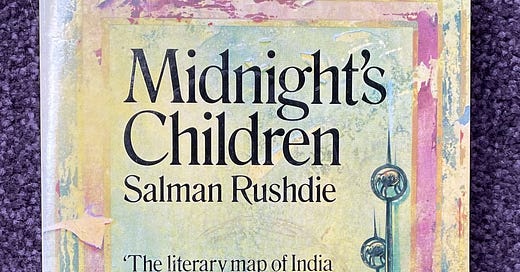Midnight's Children by Salman Rushdie
Odd but compelling novel of the personal and political in India, centred on independence
The first thing that struck me about this novel was the shade of Tristram Shandy. Let me tell you about my birth, is the gist of how our narrator Saleem begins; it was at the precise moment India gained independence. Hang on though — first I need to tell you about my parents. Come to think of it, I’d better start with my grandfather in Kashmir decades earlier. Saleem is finally born on page 116 at the end of Book 1 (of 3).
I started listening to a BBC radio adaptation of Midnight’s Children which was part of the programming for the 70th anniversary of Partition in 2017, ran out of time to get to the end before it went from BBC Sounds, added the novel to my To Read list and finally bought it at the start of this year in a charity shop. Radio adaptations, by their nature, have to play fast and loose with characters, tone, pacing etc and somehow keep the essence of the story, so it’s possible (I don’t honestly remember) that it gave no hint as to the structure. Certainly the long-winded playfulness was a pleasant surprise.
The situation is that in 1978 Saleem is setting down the story of his life, writing after his day’s work at the pickle factory is done, and he feels as though he’s pressed for time. He begins to read sections out to his assistant/companion, Padma, and reports on her reaction.
Most of the novel is therefore a kind of shaggy dog story as told to no-nonsense Padma and she doesn’t believe half of it. Surreal occurrences, weird coincidences, telepathy and magic, plus a self-confessed unreliable narrator. There are recurrent themes through the generations, repetitions or near-repetitions of events, and through it all the close entwinement of Saleem’s life with the political life of his twin, the independent state of India itself.
It’s not a comfortable read, there are some fairly unpleasant things going on from time to time and Saleem is not a particularly likeable character, but there was something about the way it was written, and the richness of description, that drew me along to the powerful ending, though it took me 8 or 9 weeks to get there. I learnt a few things about the creation of Bangladesh, too.
I’d definitely recommend Midnight’s Children if you’re at all interested in Indian history or Partition, and I can see Kate Atkinson readers really enjoying this too. Think Emotionally Weird or Behind The Scenes At The Museum: family saga, weirdness, thick with coincidence, intimate knowledge of what happened before the narrator’s birth, and a blend of humour and darkness.




